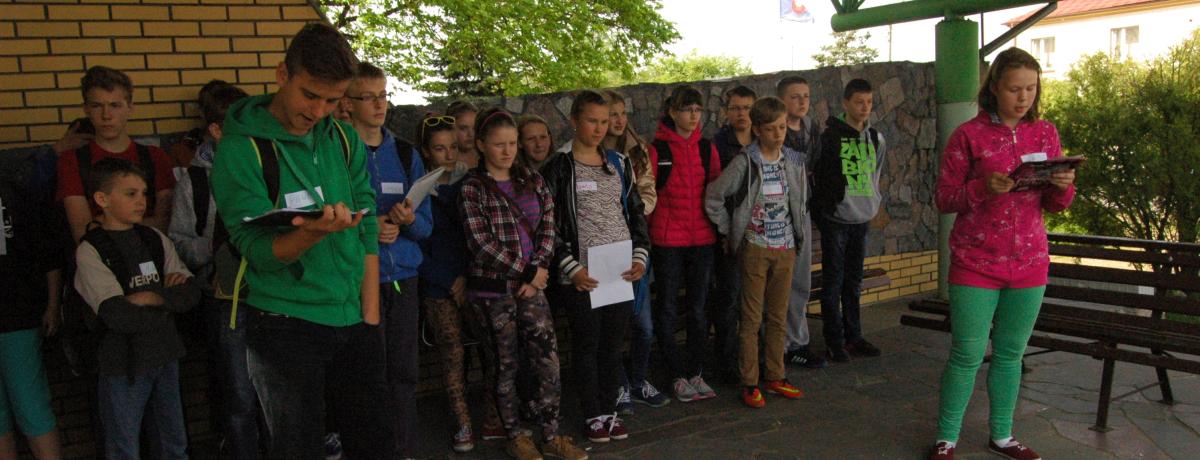| 2015 |
Bakałarzewo
Junior High School in Mikołaj Bakałarz School Complex


| 2015 |
“It’s a little strange to live in this town and not know that before World War II over 80% of its residents were Jewish. If it wasn’t for this program, I wouldn’t know anything about the Jewish people” – says 13-year-old Damian. The example of Bakałarzewo shows that disbelief of school students such as Damian and their fascination with the newly acquired knowledge of local history can lead to extraordinary creativity. Along with a group of first-year junior high school students, Damian prepared and led Bakałarzewo residents on a walking tour of the town’s Jewish history.
Although Bakałarzewo is now a village in the West-Suwałki Lake Region, up until 1870 it enjoyed city rights. This explains why the architecture and professions of the local people were more urban than rural in character. Bakałarzewo lays on the route to Konigsberg and Prussia, hence it provided favorable conditions for development of crafts and commerce. As the commercial routes to Prussia and Konigsberg developed, first Jews began to settle in the town in mid-17th century and inhabited it up until 1939.
The town was inhabited by Catholics, Jews and a small community of Germans (who were most likely Protestant). Around 1860 Jews comprised 76% of Bakałarzewo population, which meant that of the 1,317 town residents 1,008 were Jewish. Prior to World War I, the size of the Jewish population dwindled – most likely due to the town’s residents migrating to bigger cities or to the United States.
As Bakałarzewo was destroyed in 90% during the bombings in 1939, the walking tour prepared by the students relied mostly on reminiscences and memories from pre-war days and on stories about religious habits and traditions. Most Bakałarzewo Jews were merchants or craftsmen, a few farmed land and a few others were among the wealthy landowners. The Jewish community represented all socio-economic classes. One of the better known and respected Bakałarzewians was Jankiel Bialogórski, owner of Nowopole farm. Bakałarzewo was also the birthplace of Ezechiel Charlap, a Jewish social activist in Georgia and later in Israel.

Representatives of other professions and social functions could be identified by their full names – this was largely thanks to the research of Tomasz Naruszewicz, who was the project’s “good spirit and provided ample support to the students. In the course of the project, there were suggestions to write a proposal to raise funds for preservation of the Jewish cemetery and for other means of commemoration.
Apart from the Jewish cemetery by Szumowo lake, the best documented heritage site, the walking tour included a visit to the market square, and to the sites of the former synagogue, cheder, mikveh, Jewish hospital as well as the building of a pre-war Jewish school. The tour was filled with stories about Jewish holidays, traditions and professions; it also included a snack for all participants, that consisted of challah bread and apple pie. The project’s big strength was that the whole group got involved in the work; students were able to delegate different tasks in a very effective way, so that everyone would do something they felt confident with.
Some of the students became especially involved in the project: one, who eagerly imparted his historical expertise and voiced different-but-equal opinions, sometimes even to counter opinions of others; Other, who declared from the very beginning that his motivation for project work is to overcome stereotypes and happily joined in discussions on various topics. Someone was responsible for preparing the snacks and practical implementation of many ideas, someone else was responsible for cleanup work at the Jewish cemetery. Other, who was not very involved in the workshops, surprised everyone with his engagement in the project, becoming a group leader and task manager.
In the course of the workshops and subsequent project work, school students overcame their own stereotypes of Jews and sometimes even prejudice. Those who declared at the outset that they do not like Jews, during the last workshops stated that Jews are no different from them, just follow a different religion; something they had not realized earlier. The initial hostility connected to the fear of the unknown had disappeared.

School:
Junior High School in Mikołaj Bakałarz School Complex
Students:
class 1 A and 1 B
Teacher:
Marzena Chmielewska
Expert:
Tomasz Naruszewicz
Educators:
Barbara Rostek, Jagoda Szkarłat
School of Dialogue program in Bakałarzewo was made possible by the support from KAREN SHAPIRO.
In appreciation to the Conference on Jewish Material Claims Against Germany (Claims Conference) for supporting this educational program. Through recovering the assets of the victims of the Holocaust, the Claims Conference enables organizations around the world to provide education about the Shoah and to preserve the memory of those who perished.

In appreciation to Friends of the Forum for supporting the School of Dialogue educational program.
